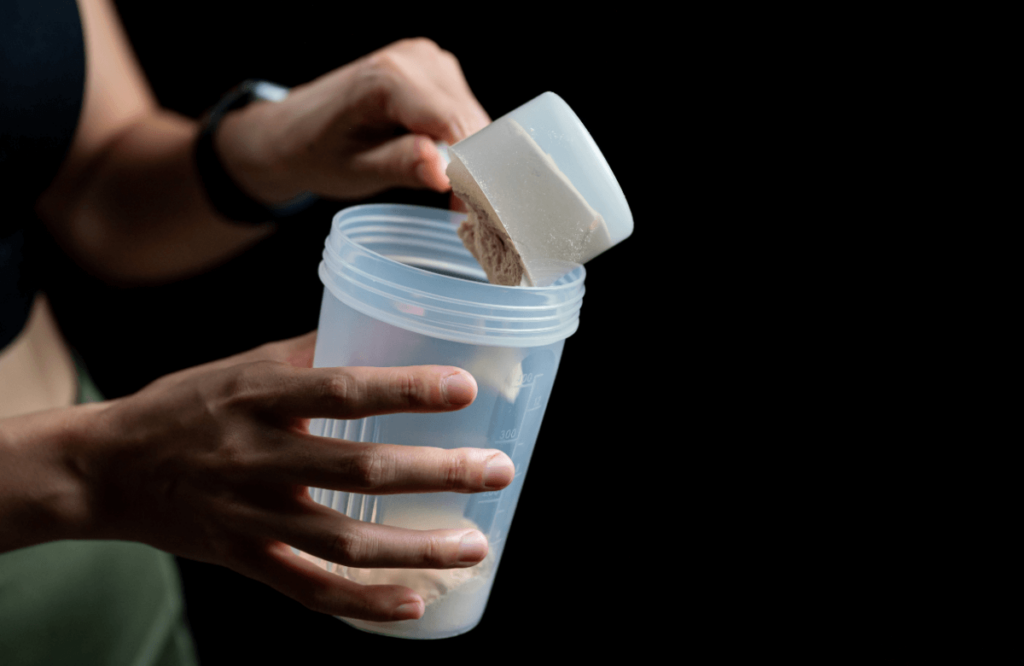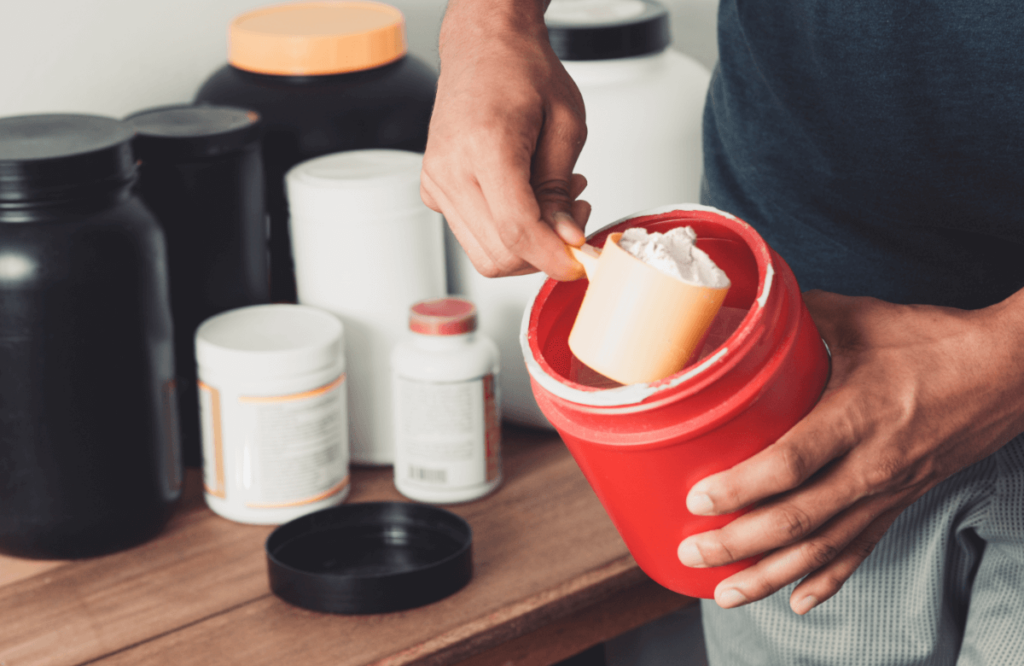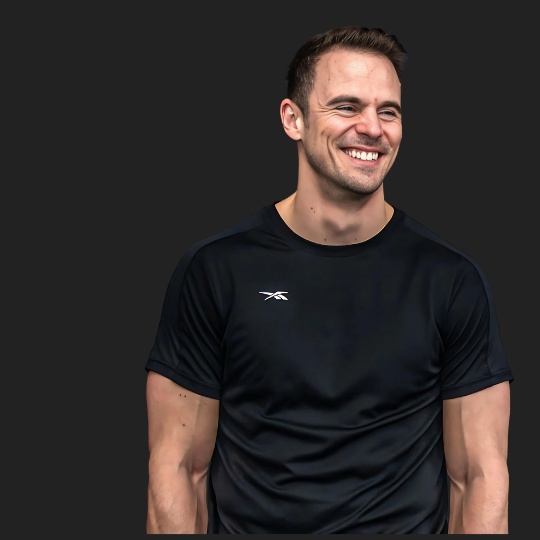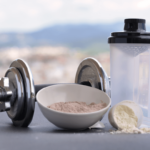Dropping pounds with creatine? Let’s separate myth from reality. Whatever your reason for cutting may be, making plans about it is a whole lot easier than doing it. When cutting, you want to get rid of fat, while retaining as much muscle mass as possible, all with the goal of looking lean.
Having proper nutrition, doing cardio and having a suitable strength training regimen are all very important parts, but supplements also play a major role when cutting. Supplements can make a significant difference when it comes to changing the appearance of your body. Creatine is incredibly effective for boosting your performance when training and for gaining mass.
Jump to:
- Creatine and Weight Loss: Does Creatine Reduce Belly Fat?
- Creatine & Dieting: Should I take creatine while trying to lose belly fat?
- What Is Creatine?
- How Does Creatine Work?
- Benefits of Creatine While Cutting
- How Much Creatine Should You Take When Cutting?
- Safety Considerations and Side Effects of Taking Creatine
- Tips for Healthier Cutting
- Is Creatine Safe?
- FAQ: Does Creatine Help You Lose Weight?
Creatine and Weight Loss: Does Creatine Reduce Belly Fat?
While research on using creatine for weight loss reveals it doesn’t directly lead to substantial fat shedding, it doesn’t mean it’s without value for those looking to modify their body composition.

Creatine supplements can help you build more muscle, which consequently increases your metabolism and boosts your ability to burn fat as fuel. What this means is that in the long run, creatine supplementation can help you burn belly fat if you continue to stick to a healthy diet and exercise regularly, even after you have stopped taking the supplements.
Creatine & Dieting: Should I take creatine while trying to lose belly fat?
Here comes the million-dollar question – can you take creatine whilst trying to lose belly fat? Well, the short answer is– yes.
However, one of the biggest disadvantages of creatine is the fact that since it helps draw water into the cells, it can cause water retention, and thus bloating. Due to this extra water weight, if you take creatine in your cutting phase, you might notice your muscles look ‘puffier’ and you might even gain weight.
Nevertheless, it’s important to keep in mind that these extra pounds are due to excess water retention rather than fat gains.
To avoid this issue, experts recommend to avoid taking creatine monohydrate and instead go with creatine that has an increased absorption rate. Your best options in this case are micronised creatine and creatine ethyl ester.
For a better absorption rate, fitness experts also suggest taking creatine right after you’re done with your weight training session, along with a simple sugar. The sugar will cause a spike in insulin, which will help to transport a bigger amount of the creatine into the muscles. This way, more of the creatine will get used up, instead of going to waste and causing water retention.
However, some people will have a negative reaction to creatine and will gain water weight no matter what. So, if this is your case, you might want to try out alternative creatine supplementation.
What Is Creatine?
Creatine monohydrate is the king among supplements if you’re looking to build lean muscle mass. Decades of research have shown that creatine has traveled up the ranks of bonafide ergogenic aids. It is highly effective for a diverse range of physiological processes, including increased muscle hypertrophy, higher work output, and even improved cognitive abilities.
Creatine is a naturally occurring nitrogenous compound that’s synthesized in the human body and can be also found in foods such as fish and red meat. Scientific research has shown that creatine helps speed up muscle growth and recovery.
But what about weight loss? Does creatine help you lose weight and get rid of body fat during a cutting phase? Let’s find out.
How Does Creatine Work?
Creatine is stored by the muscles in the form of creatine phosphate, which has an essential role in the ATP (Adenosine Triphosphate) energy system. ATP is a natural source of energy that the muscles use. By boosting your ATP levels, you can exponentially increase your training intensity and muscle hypertrophy.
As we already said, the human body naturally produces creatine. However, the main issue is the fact that this amount of creatine is just not enough to provide significant benefits. The creatine that the body produces is quickly converted into ATP by the muscles, but these amounts are only beneficial for a few seconds.
This is why creatine supplements are so popular for boosting lean muscle mass and speeding up muscle recovery.
Muscle Growth and Recovery
Simply said, the more creatine there is in your body, the more ATP can be produced, and therefore, the more energy your muscles will have. This boost in energy will help you train longer and with a more intense pace.
Benefits of Creatine While Cutting

Taking oral creatine supplementation while cutting can lead to an increased muscle mass while also providing a significant boost in power and strength.
How It Works
Creatine supplements can help protect and support your muscles during the cutting period by bringing more water to your muscles. This excess water weight can help boost and protect your muscle fibers from damage. This is why drinking plenty of water when cutting is essential. Water protects your muscles from injury or breakdown from dehydration during the cutting phase.
Research has shown that using creatine during a trial of 4 weeks of intense training and lifting weights while cutting, can help you lose fat, boost your muscle size and strength, and increase power performance.
Other studies have also shown that creatine supplementation can increase endurance without affecting fat mass.
How Much Creatine Should You Take When Cutting?
The optimal amount of creatine when cutting is 20 grams per day. Many athletes and sports professionals take a creatine loading dose of 20 grams per day for about 1 month. Although that might be effective for a certain period of time, it’s not the necessary amount to see some muscle benefits from creatine.
The recommended dose is approximately 0.3 grams/kg body weight, four times a day for a period of 5–7 days.
3–10 grams of creatine a day may help with maintenance. Once your creatine stores are full, taking 3–5 grams a day can help maintain that amount in your system. Some data shows that bigger athletes might need to take much as 5–10 grams per day to maintain their creatine stores.
All in all, creatine supplementation during your cutting phase won’t impede your weight loss goal. As a matter of fact, it might even provide benefits beyond just muscle protection.
Safety Considerations and Side Effects of Taking Creatine

Some of the negative side effects from taking creatine are often associated with cutting too many calories or losing too much fat too fast. Rapid weight loss due to aggressive cutting can have a negative impact on both your mind and body. The effects can differ from a person to a person.
Side Effects
An upset stomach – During the loading phase of taking creatine supplements, taking 10 grams of creatine may irritate your stomach and cause diarrhea. To avoid these issues, it’s safest to take smaller and divided doses of creatine over a longer period of time (3 to 5 grams).
Weight gain – Cutting too much might also result in regaining weight after the cutting phase is over. This is why it’s important to take things slow and make your cutting phase as easy on your body as possible.
Studies have shown that quick weight loss can also affect your:
- heart rate
- energy levels
- blood pressure
- hormones
- muscle strength
What’s more, during the cutting phase, some men might experience lower levels of testosterone, while some women might miss their period.
Tips for Healthier Cutting
Here are a few suggestions on how to make cutting easier on your body and mind and avoid the potential side effects.
- Plan for a slower and more moderate weight loss. This is a much safer way as it helps preserve your lean body mass and keeps your energy levels more stable while still cutting fat.
- Eat properly. Make sure to include at least 1.25 to 1.5 grams of protein per pound of body weight so that you can preserve your muscle mass while still shedding fat.
- Take a maintenance dose of 3 grams oral creatine supplement to boost your strength, power, and the speed of your recovery.
- Drink plenty of water. Staying hydrated is essential for your mind and physique not only when cutting but in every stage of your fitness progress as well.
- Get the proper amount of restful sleep – at least 7-9 hours per night as good sleep is crucial for your mental and physical health, focus and endurance.
Is Creatine Safe?
Creatine is one of the best sports performance supplements available on the market. However, even despite its research-backed advantages, some people avoid taking it because they worry it might be bad for their health.
Some people claim it causes leg cramps, unwanted weight gain and digestion. However, hundreds of studies have been conducted on its safety, and all of them support its health benefits and effectiveness.
The bottom line is, creatine is one of the most affordable, most effective, and safest supplements to take if your goal is boosting resistance training performance, strength and muscle gain.
FAQ: Does Creatine Help You Lose Weight?
What is creatine?
Creatine is a naturally occurring compound found in small amounts in certain foods and produced within the body. It plays a pivotal role in the production of cellular energy during short, high-intensity activities.
How is creatine usually consumed?
Creatine is commonly consumed as a dietary supplement, often in powder form. Many athletes and fitness enthusiasts take creatine supplements to boost performance and support muscle growth.
Does creatine directly promote weight loss?
No, creatine does not directly promote fat loss. However, it can help increase muscle mass, and muscle burns more calories at rest than fat. This can indirectly create a higher energy expenditure, which can contribute to weight loss when paired with a calorie deficit.
Will creatine cause water retention?
Yes, creatine can cause water retention in the muscles. This might lead to a slight weight gain when you start supplementing, but this is mainly due to the increase in intramuscular water, not fat.
Can I use creatine while cutting or trying to lose weight?
Yes, using creatine while cutting can be beneficial. It can help maintain strength and muscle mass, which can be compromised during a calorie deficit.















